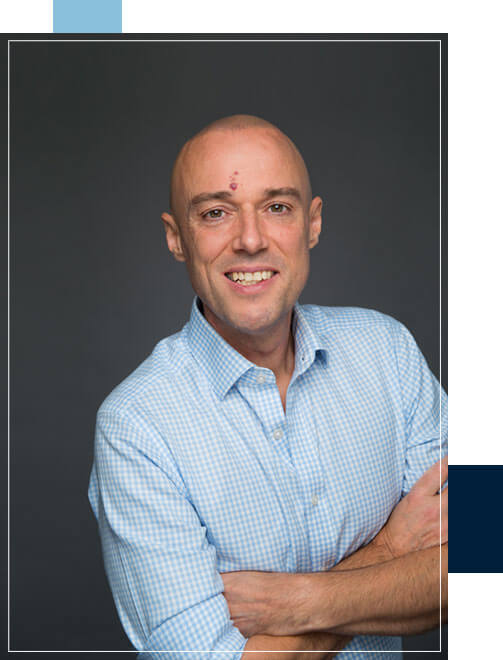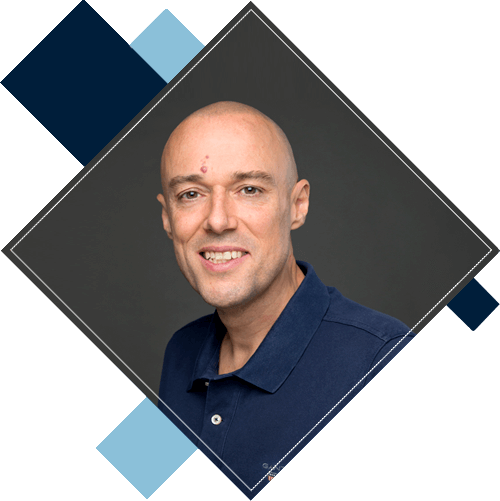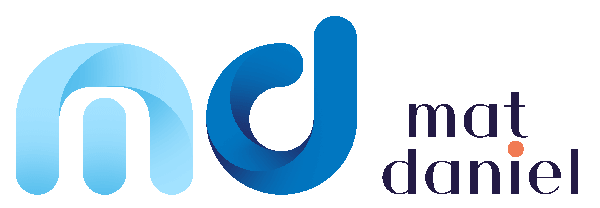Mat Daniel.
Coaching for Doctors and Healthcare Teams
I help doctors manage career transitions, challenges, and opportunities to create a successful and meaningful career. I partner with healthcare teams to help them work better together so they achieve outstanding results as a thriving high-performing team.

About Me
From Personal Experience to Professional Calling: A Journey to Coaching Doctors and Healthcare Teams
My interest in helping others has always been with me. I wanted to do medicine from a young age, but it nearly didn’t happen. I’m of mixed European Scottish heritage, and when I moved to UK at the age of 16, I was told that my aims were too high as a migrant and that I should settle for something that doesn’t need such good grades. I ended up not going to university at all, and took a job as a phlebotomist instead. Then I got A level results and realised that actually I did do well enough to get into medical school, and working in a hospital made me realised that medicine was for me. So I entered medical school, but very early experienced the prejudices of others, and the negative impact that bad careers advice can have.
I worked hard at medical school and came top of the year. I knew early on that surgery was for me. I entered ENT by chance rather than by design, being fortunate to work in an old fashioned system where people rotated around a range of posts, and broad experience, apprenticeship, and time-served were seen as assets rather than failures/liabilities. I enjoyed research, completed a PhD towards the end of my training, obtained external grants, and won prizes with my work; some 10 years later I still maintain industry collaborations arising from my research, and I hope that my research continues to have an impact.
Once working as a consultant, I realised that I can also have an influence of the staff around me, as well as patients. I did a Masters in Medical Education, and when the opportunity arose, took on the role of ENT lead at our university. I was also involved in professionalism, and have been Training Programme Director. I also became engaged with national committees, serving on the council of British Otorhinolaryngological Research Society, and Students and Foundations Doctors in Otolaryngology.
Like many doctors, once the impostor syndrome of being a new consultant settled down, I began to wonder what’s next for my career. Asking myself “Is this it?” coincided with a period of ill health leading to a wholesale reappraisal of where my life is heading. I had coaching, which helped me discover my love for both great patient care as well as for developing others around me. After spending a couple of years thinking how I can bring my wished of making a difference to others, I decided that training as a coach was one way that I can do that.
The year-long coach training programme accredited by the Institute of Leadership and Management and run by the British School of Coaching was an eye opener. It made me realise how the medical model of “doctor knows best” might work for patients, but this is not how one develops people. On the other hand, coaching, with unconditional positive regard, asking questions rather than offering answers, and gentle challenge, is a much better way to help others find their own way forward. Studying coaching gave me a new appetite for learning, and I have read widely and attended numerous short coaching courses. I have also engaged with the coaching professional bodies and communities, helping set up and now co-chairing Association for Coaching’s Co-Coaching Forum for Health and Social Care. I then decided to study coaching at an even greater depth than ILM by enrolling in a Masters in Coaching and Mentoring with Oxford Brookes University.
I use coaching as a way of leading now, and hope that others benefit from my coaching expertise. I continue to work full time in the NHS; coaching is an additional way that I can help others, and it doesn’t replace my dedication to great patient care.
I have a successful and meaningful career as a consultant, combining NHS clinical work with undergraduate teaching commitments. Coaching enables me to use my own experiences and coaching expertise to help other doctors create successful and meaningful careers, both in clinical and in leadership spheres.
Outside of work, I live with my partner and two dogs. I enjoy gardening, running, and the outdoors in general. The video below illustrates what gives me joy - hope it brings a smile to your face too.
Mat Daniel - MMEd MA(Coaching) PhD FRCSEd(ORL-HNS)
Specialised Coaching for Doctors and Healthcare Teams
I have 30 years’ experience in healthcare, and work as a Consultant Paediatric Otorhinolaryngologist. I have a PhD, a Masters in Coaching and Mentoring, a Masters in Medical Education, and have / had leadership roles at University, regional and national level. I teach coaching, and am my hospital's lead for medical career development. I am passionate about diversity. Coaching is a natural extension of my work as a doctor. I am altruistic and driven by a wish to help others, underpinned by my core values of curiosity, love of learning, honesty, fairness and kindness.

My coaching experience and qualifications
My Masters degree in Coaching and Mentoring Practice from Oxford Brookes University was a two year programme that included studying adult development / learning and psychology, as well as undertaking supervised and observed coaching. During the course I developed my own coaching model, and undertook a research project. Not many coaches are trained to such a high level. The International Centre for Coaching and Mentoring Studies at Brookes is a world-class centre for coaching and mentoring, engaged in coaching research as well as training.
I hold a formal qualification in Coaching and Mentoring, accredited at level 5 by the Institute of Leadership and Management and delivered by the British School of Coaching. This was a one-year programme that included theory, practical application, and direct observation & assessment of my skills.
I have completed formal training in career coaching, and am a licensed career coach with Career Counselling Services.
I have completed formal training in team coaching.
I am accredited in the use of the EQ-i 2.0 / EQ-i 360 emotional intelligence instrument, a validated psychometric questionnaire that is used to appraise and develop emotional intelligence.
I am an EMCC Accredited Coach at Senior Practitioner level.
I have completed a variety of short courses / masterclasses such as:
- Transactional Analysis 101 course
- Accredited Certificate in Group Coaching and Facilitation
- Acceptance and Commitment Training Course.
- Resilience Masterclass
- Positive Psychology Masterclass
I am a member of the Association for Coaching and the European Mentoring and Coaching Council. I adhere to the coaching Global Code of Ethics.
I initiated, helped set up, and now co-chair the Association for Coaching's co-coaching forum for Health and Social Care.
I have contributed to the Association for Coaching's magazine Coaching Perspectives, writing about coaching in the operating theatre and about coaching gay men.
I maintain professional liability insurance and take part in Continuous Professional Development relevant to coaching. I undertake supervision of my coaching work, this means regular meeting with an experienced coach supervisor where we discuss my coaching, outcomes, and feedback (I regularly request feedback from coaches to ensure that I am delivering what is needed and to help my ongoing development).
I am qualified as a coaching supervisor.
I am a founding partner at Oxford Coaching Partners.
I have done more than 600 hours of coaching.
Have a look at what others say about my coaching.
My Roles in Healthcare
Current roles include:
- Undergraduate lead for ENT at our University
- Consultant peer mentor
- Council member of Students and Foundation Doctors in Otolaryngology
Past roles include:
- Training Programme Director
- Audit lead
- Appraiser
- Guidelines lead for ENT at our Trust
- Secretary of Otorhinolaryngological Research Society
- Secretary of British Society for Academic Otorhinolaryngology
- Secretary of British Otorhinolaryngology and Allied Sciences Research Society
- Journal section editor



I would like to say I’ve not used the word career in a positive sense for almost 10 years. It had felt a career had deteriorated into a ‘job’. Thank you
GP discussing career management

Coachee Success Story
Real-Life Examples of My Impact
The story of a surgical trainee navigating career transitions.
"I approached Mat during a difficult period in my specialty training. I was going through some self-doubt and uncertainty about my future. I wanted help to navigate this so that I could progress to the next phase of my training with some clarity and self-confidence. Working with Mat helped me to do this. The following are ways in which the coaching helped me both personally and professionally:
Clarity in my career goals: I have gained a deeper recognition of my values and how to align them with my career goals. I realised that I frequently downplayed my own abilities compared to others. My approach to feedback and praise from seniors has improved significantly. This has enhanced my ability to gain fulfilment at work.
Increased self-awareness: I have developed a deeper insight into my natural strengths and weaknesses when working independently and within teams. I am now generally better at leveraging my strengths at work and better recognising my weaknesses so that I can look to improve them. Gaining a deeper understanding of my workplace and personal values has helped me to anticipate potential stressors in different work environments and to reflect on challenging events with a better insight.
Navigation of career transitions: Being a registrar has involved multiple job and location changes, with multiple pressures to take on additional roles and responsibilities. This has brought a sense of pressure. Coaching has helped me to identify the key factors to consider when selecting my preferences for future training jobs and when considering specific additional projects and out-of-programme activities.
Work and life balance: through Mat’s coaching I have a clearer and more mature appreciation on how to balance the demands of my personal and professional life. I have gained a better understanding of the interplay between the two.
Support and motivation: Mat has helped me to overcome specific obstacles and limiting beliefs that occasionally restricted me as I work towards career goals. I now have a better ability to navigate through periods of challenge."
Read more Case Studies here.
Coaching Approch
Understanding your world. Flexible in my approach.
I have an enjoyable and successful NHS career. I face the same challenges you might do also, including burn out, major illness, bullying, misalignment of values, and difficult career decisions. I have developed my own ways of dealing with the pressures of working in the NHS, and hope to help you develop your own way to thrive. Unlike many doctor-coaches, I continue to work for the NHS and have not left healthcare.
I know about health, research, teaching, training, leadership, teamwork, and diversity, as well as coaching. I have a wide range of experiences that enable me to understand the world that you move in. I am and have been part of multiple teams, and have experience of good and bad teamwork, in addition to my theoretical knowledge around team dynamics.
I have the right training to support you with coaching. I have a Masters degree in Coaching and Mentoring, and am one of few coaches to have studied coaching at such an advanced level. I am also a licensed career coach, and accredited with the European Mentoring and Coaching Council. I engage in ongoing professional development as a coach, including with regular coaching supervision. I am a qualified coaching supervisor too.
I specialise in and am experienced in coaching doctors and healthcare teams.
I am flexible in the type of support that I use, and have skills beyond coaching. Sometimes you may need me more as a mentor than a coach, or more as a team developer than a team coach. If that is the case we will agree on a change in how we work and I will continue to be able to help you if my skills allow.
I have helped many people through my coaching, see some of their feedback here.



Mat is great for showing your problem from a completely different point of view. He can ask questions that you end up thinking about for days and they help to see your problem as you never thought about.
Consultant Surgeon

My Professional Coaching Philosophy
The Philosophy of Personal Growth and Professional Development
The coaching relationship underpins my coaching. The relationship is essential for success. In coaching I fundamentally see you (the individual or the team) as striving for and being capable of becoming the best that you can be. Coaching then is a shared journey where you are the expert in being you, and I am a participant in your growth journey. Together, we form a relationship that supports your achievements and progress. You set the agenda, and we will discuss whatever matters to you.
However, I do not see myself as a passive bystander in the coaching relationship. Listening is a key aspect of coaching, but there is more. I will ask questions, point out patterns and inconsistencies, and challenge you to notice your actions and assumptions. You will hear me challenge, but of course it may be me making assumptions rather than you, or maybe both of us are - so feel free to challenge me in return, and give me feedback as we go along. Through questioning and challenging I hope to help you examine world views that are being taken for granted, and, if appropriate, develop new ways of seeing that world that are more useful and better suited to the present circumstances.
I might also share some of my own experiences, or how others have managed similar situations to yours, or I might suggest certain ways of viewing the world that may be helpful; these serve as invitations for you to consider, but what you do with them is always up to you, as you are the only person who can possibly know what is right for you.
For me the notion of choice is a key aspect of human existence. Whilst it may not be possible to change external factors, it is possible to choose how one responds to them, how one thinks, feels, behaves, and who one is. Each person constructs their own unique meaning in life. Inherent in this view is an appreciation that people can and do change, and that different contexts lead to different choices potentially setting up an internal conflict. Choosing one's own paths in life is incredibly empowering, but at the same time also scary because it means having to make those choices, take responsibility for the outcomes, and accept things outside of one's control. Coaching helps you recognise the choices that you have, and supports you in making those choices. It also helps you recognise where you don't have choices, and helps you find a way of accepting that.
Everyone is a unique individual with their own view of the world. This means that other unique individuals might have a different view of the world than I, although of course we all influence each other and create socially-constructed context-dependent meaning. So one aspect of successful human relationships is accepting, appreciating, valuing, and celebrating the different views, rather than judging things as right or wrong. Coaching can help develop a pluralist view of human interactions. I have a postmodern view of the world, recognising that hard truths no longer exist - instead, as a society we socially create what we deem to be the truth. Of course, different societies in different eras create different truths, this makes it hard to exist in a world where truth and knowledge are no longer just about hard facts.
Identities and narratives are a key part of my coaching. I don't think we have just one identity. I think we all have multiple identities, and that these identities are based on the stories that we construct about ourselves based on our interaction with others. My coaching then helps people identify and appraise their narratives and identities, and develop new ones that are best suited to the reality or desired future. You might hear me use the terms narratives and identities in coaching, but you are just as likely to hear me ask "what's your mind saying" or "what does this say about the kind of person you are", or "what kind of a person do you need to be".
Whilst narratives and identities might require deep exploration, my coaching is also practically orientated for when the goal is already clearly know. Here I work with a solution-focused approach that taps into what you are already doing to deliver more of what you desire.
Team coaching is similarly influenced by what I have outlined above. In team coaching, we are likely to spend a significant amount of time at the beginning developing psychological safety, as this is a key pre-requisite for successful teamwork. Team coaching is likely to examine internal team processes and relationships (including learning and leadership), external processes and relationships, and the team's mission and objectives. The focus will be on what the team itself wishes to discuss.
Take the Next Step
Contact Me For a Consultation
My coaching process starts with a free 60 minute session, designed to help us both see how coaching can help you and how we might work together. You can start your coaching journey here. Or, if you have any questions you can contact me here.

